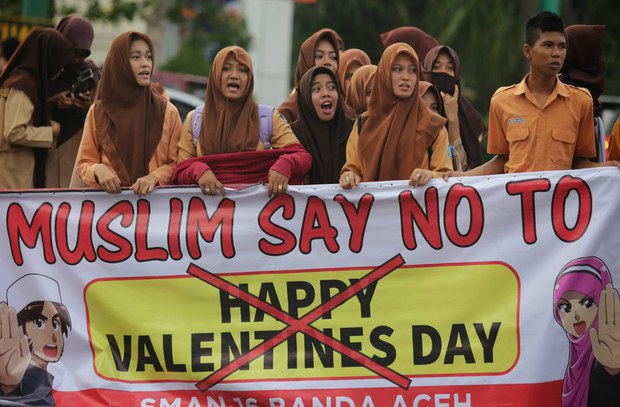Concept of Islamic Caliphate Grows More Popular Among Indonesian Students: Survey
2017.10.31
Jakarta
 Indonesian students display a banner during a protest against Valentine’s Day in Banda Aceh, capital of the northwestern Indonesian province of Aceh, Feb. 13, 2016.
Indonesian students display a banner during a protest against Valentine’s Day in Banda Aceh, capital of the northwestern Indonesian province of Aceh, Feb. 13, 2016.
About a fourth of Indonesia’s college students support fighting for the implementation of an Islamic caliphate system in the world’s most populous Muslim-majority nation, a survey released Tuesday showed.
The Jakarta-based Alvara Research Center and Mata Air Foundation polled 1,800 students from 25 leading universities in Indonesia and 2,400 students from high schools across Java and other islands to determine if early detection of radicalism among campus populations could predict Indonesia’s future.
“We asked about the state ideology with a statement saying, ‘The Islamic state is worth fighting for to implement more consistent Islamic teachings’ and 23.5 percent of college students agree [with the statement], and 16.3 percent of high school students agree,” Alvara CEO Hasanuddin Ali told reporters in Jakarta on Tuesday.
“Intolerance has penetrated students’ life in schools and later grows stronger in campus life through religious studies,” Hasanuddin said. “If we can start handling it on campus, radicalism will be so much easier to be erradicated among professionals.”
Hasanuddin said the survey, conducted on Sept. 1 to Oct. 5, also revealed that 17.8 percent of university students and 18.3 percent of high school students preferred the concept of a caliphate ruled by a Muslim spiritual leader over Indonesia’s current republic.
The survey found that 18.6 percent of university students and 16.8 percent of high school students preferred Islam over the official Pancasila foundation of five principles as the state ideology. The university and high school students also preferred sharia law at the local level, by 21.9 percent and 19.6 percent, respectively.
Pancasila, the five-pillared official philosophy that underlies Indonesia’s foundation, espouses unity in diversity along with democracy and social justice.
‘Red-alert’
Nusron Wahid, a prominent member of Indonesia’s largest Muslim organization, Nahdlatul Ulama (NU), said he was shocked by the survey’s results.
“One person committing a suicide bombing in the name of religion has torn many lives apart. It’s worse what those in a 20-percent group can do,” Nusron told reporters. “Indonesia is facing red-alert status in ideology."
“I always believed one who can control universities will control the public,” he said. “If the idea of a caliphate has its own space in the universities, it will grow bigger in the next few years.”
He said he hoped that the survey would motivate the government to revive religious-affairs classes in schools and universities.
“And it’s not just a huge homework assignment for the Ministry of Religious Affairs, but also for Indonesia as a nation. We need to revive the curriculum of religious affairs, because it should be adjusted with the current situation,” he said.
Nusron also called on NU and Muhammadiyah, another of the country’s large Islamic organizations, to step up.
“Moderate Muslim organizations like NU and Muhammadiyah need to change their style of dakwah [spreading the good messages of Islam] for millenials to understand. [The message] should be light, short yet strong,” he said.
Increasing intolerance
Akhmad Muqowam, secretary-general of the Diponegoro University Alumni Association, said the survey revealed an increase in intolerance among students.
A similar 2009 survey, he said, showed that the concept of a caliphate was acceptable to less than 12 percent of respondents.
“It should be our main concern,” Akhmad said, adding most students fail to understand the difference between religious interest and humanity.
“They consider going to Afghanistan and Pakistan [for jihad] is an advanced step in implementing Islam as a whole. Most of the students are too inexperienced in differentiating the concept of state and religious interest,” he said.
Didin Wahidin, director of student affairs at the Ministry of Research, Technology and Higher Education, said the survey results would be used to guide his office.
“We allow universities to stage extracurricular activities to help implement the values of the state ideology, Pancasila. Meanwhile, our education in religious affairs has been focusing on mere basic teaching of Islam,” he said. “The nonexistence of moderate Islamic student organizations has allowed other groups to present alien ideologies.”
“We have set standards in education, research and social responsibility, but not in student affairs. It means, legally, there is no sanction to be given to any university that fails to stage student activities,” Didin said.
The survey also found that 29.5 percent of university students and 29.7 percent of high school students did not want non-Muslim leaders to govern in Indonesia. The survey had a margin of error of 2.35 percent for college students and 2 percent for the high school students.
The survey was published two weeks after the new governor of Jakarta, Anies Rasyid Baswedan, took office after being elected in a bitter and tense race that divided Indonesians along religious and racial lines. In April, Anies defeated Gov. Basuki “Ahok” Tjahaja Purnama, who soon after was sent to prison on blasphemy charges for allegedly making public comments that were perceived as anti-Muslim.







